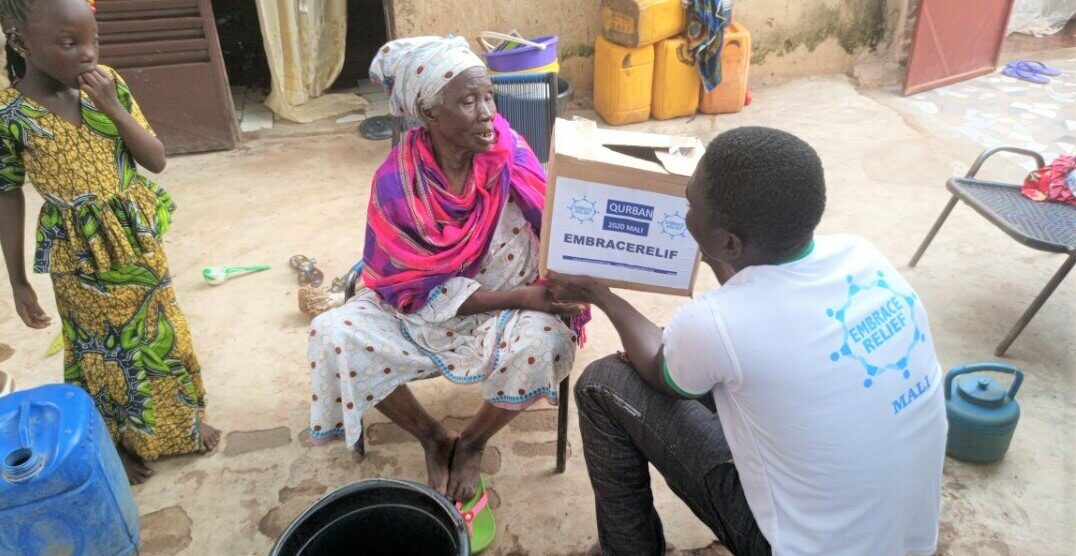Protein is an important part of a balanced diet. Read on below to find out how much protein you need every day, and what foods will provide it for you. In the meantime, why not help people in need around the world get the protein they need? Donate today to Embrace Relief’s International Hunger Relief: Qurbani 2022 campaign and give people the gift of a full stomach.
According to the U.S. Dietary Reference Intake, a sedentary young adult should consume about 0.36 grams of protein per pound of body weight every single day. So if you weigh 150 pounds, it is recommended you consume 54 grams of protein every day.
Your daily recommended amount of protein is greater if you are over the age of 40 (a recommended protein intake of 0.54 grams per pound will help offset the loss of muscle mass that occurs as we age.) Young adults who exercise regularly should also eat or drink additional protein, in the 0.6-0.7 grams-per-pound range – that is to say, a highly active 150-pound adult should consume approximately 90-100 grams of protein a day.
No matter your age or activity level, protein is an important component of a healthy diet. Consuming protein provides us with the fuel our bodies need to get through the day, and the amino acids inside the protein-rich food we eat are the building block of body tissue, promoting our body’s growth and maintenance.
This is why it’s important to be mindful of your diet. Foods including all types of meat, poultry, eggs, fish, eggs and cheese are called “complete” sources of protein, because they contain all of the different types of amino acids that our bodies need. Other foods, like rice, beans, corn and tofu, contain only some of these amino acids on their own, but can make up part of a perfectly healthy protein diet when combined (like a meal including both rice and beans).
So how much protein are you getting from each kind of food? Here’s a breakdown:
- 1 egg = 6 grams of protein
- 1 cup of soy milk = 7 grams of protein
- 1 cup of skim milk = 8 grams of protein
- 1 cup of rice or pasta = 9 grams of protein
- 5 ounces of Greek yogurt = 12-18 grams of protein
- 0.5 cups of cottage cheese = 14 grams of protein
- 3 ounces of crab or lobster = 18 grams of protein
- 1 cup of quinoa = 18 grams of protein
- 3 ounces of beef, pork, lamb, poultry or fish = 21 grams of protein
- 3 ounces of cheese = 21 grams of protein
If you eat a varied diet as most Americans do – whether omnivorous, vegetarian or vegan – you very likely eat more than enough protein per day to keep your body healthy and strong. It’s easy to take our abundance for granted.
But for millions of people around the world living in impoverished conditions, who don’t have the luxury of selecting all of the foods they need to balance their diet, getting enough protein is a daily struggle.
Donate meat to people in need this Qurbani
That’s where you – with the help of Embrace Relief – come in.
A commitment to fighting hunger wherever it exists on the planet is one of the foundations of Embrace Relief’s work. To mark Qurbani and the celebration of Eid in July, Embrace Relief’s International Hunger Relief: Qurbani 2022 campaign is providing meat packages to tens of thousands of needy people in more than a dozen countries, including in sub-Saharan Africa, the United States, Greece and Yemen.
Embrace Relief’s Qurbani packages will contain sheep, cattle or goat meat, all of which has been 100% humanely and hygienically slaughtered. This meat is high in fat, protein, minerals and vitamins. For many of the recipients we serve, this may be their only chance to access the nutritional benefits of meat all year.
The cost for each package in each area we serve depends on the local market price for the meat. Here’s how much it would cost for you to lessen the burden of hunger for eight families this Qurbani:
- Africa: $175
- United States: $265
- Greece: $265
- Yemen: $265
With your help, we can combat food shortages and provide hope to people in need in places like sub-Saharan Africa, Yemen, Greece and the United States. Every contribution you make helps one more family go to bed on a full stomach, and brings us one small step closer to ending world hunger.

















